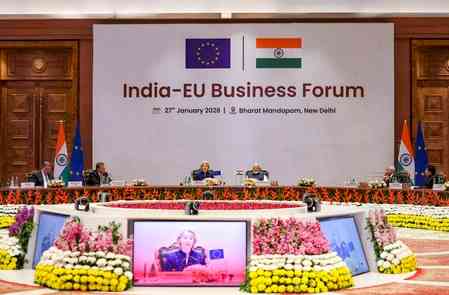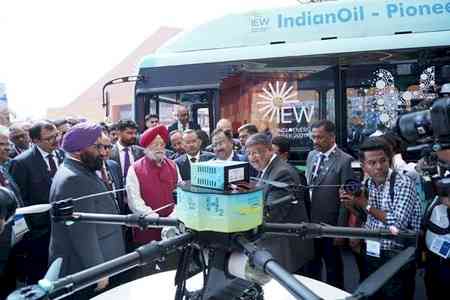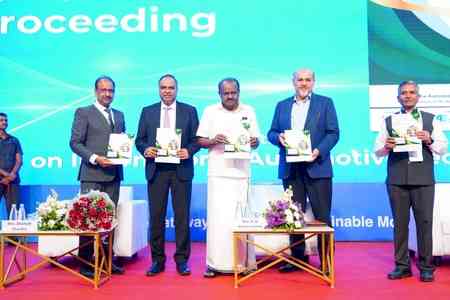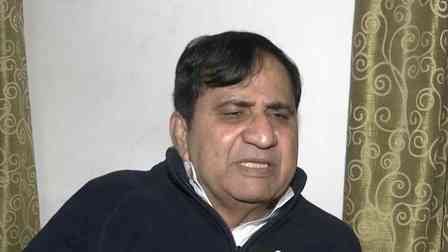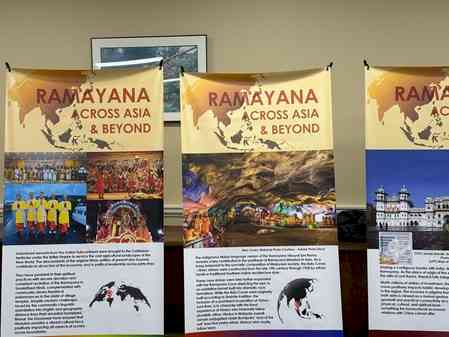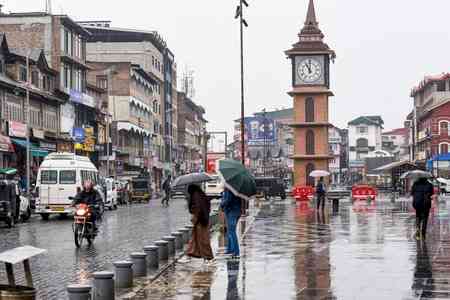DST-FICCI Workshop on National S&T Survey 2024-25
The Department of Science & Technology (DST), Government of India, together with FICCI, organized an outreach workshop in Hyderabad on the ongoing National S&T Survey 2024-25. The survey provides insights on R&D investment, S&T workforce, India’s global standing, and other key indicators that shape the nation’s research & innovation policies. It also contributes to the SDG Global Indicator Framework and the Global Innovation Index.
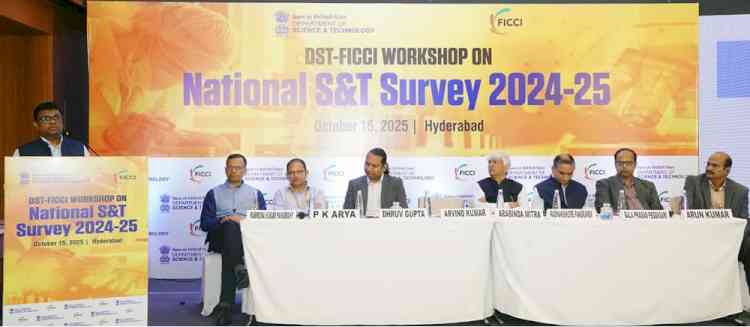
Hyderabad, October 15, 2025: The Department of Science & Technology (DST), Government of India, together with FICCI, organized an outreach workshop in Hyderabad on the ongoing National S&T Survey 2024-25. The survey provides insights on R&D investment, S&T workforce, India’s global standing, and other key indicators that shape the nation’s research & innovation policies. It also contributes to the SDG Global Indicator Framework and the Global Innovation Index.
The workshop was graced by Dr. Arvind Kumar, Advisor & Head, NSTMIS, Department of Science & Technology (DST), Government of India, Dr. Arabinda Mitra, Former Adviser & Head, DST and Former Scientific Secretary, O/o PSA to the Government of India, Dr. Rabindra Kumar Panigrahy, Scientist-E, NSTMIS, Department of Science & Technology (DST), Government of India, Bala Prasad Peddigari, Chief Innovation Officer, TCS, Dr Radhakishore Pandrangi, Chair, FICCI Telangana Aerospace & Defence Committee & Director, HC Robotics Pvt Ltd; Arun Kumar, Addl General Manager - Strategic Cell, Bharat Dynamics Limited, Dhruv Gupta, Member, FICCI Telangana Executive Committee & Partner – Strategy & Innovation, Eternify Advisors.
Despite the increasing role of private enterprises and multinational corporations in India's innovation economy, participation from the industry in the Science and Technology (S&T) survey has historically been low. Many private sector players are unaware of the survey's importance. The workshop emphasized that the data collected from the survey is not only used domestically but is also shared with central government ministries and international agencies for policy development and global reporting. It was stressed that active engagement from the industry is essential to accurately capture and represent India's true innovation potential on global platforms. Industry participants were reminded of the benefits of joining the survey, including access to sectoral benchmarking data, visibility in national science and innovation discussions, and alignment with future-oriented policies.
The National Science and Technology Management Information System (NSTMIS), Department of Science and Technology (DST), Government of India, has been conducting periodically national surveys to collect data on resources devoted to S&T activities (mainly R&D) in the country. Based on survey data, a number of S&T reports are published, providing vital information on national R&D indicators which serve as evidence-based for S&T assessment and policy formulation.
The national S&T survey 2024-25 aims at capturing the current R&D landscape by collecting information from around 8000 R&D organizations viz., public sector, private sector, MNCs, higher education, SIROs and NGOs spread across the country. A structured questionnaire based on international standardization of S&T resources has been designed seeking information on various aspects such as General Information, Expenditure on S&T (R&D) activities, R&D Manpower.
Addressing the gathering Dr. Arvind Kumar, Advisor & Head, NSTMIS, Department of Science & Technology (DST), Government of India; said, “This unique workshop has received an overwhelming response from both industry and research institutions, reflecting the growing synergy between the two. The Department of Science and Technology (DST), as the nodal agency for policy matters, plays a pivotal role in nurturing and supporting science, technology, and innovation across the country. One of its core mandates is to assess and benchmark India’s scientific and technological potential, to understand the nation’s scientific landscape and use this data for informed policy planning. To achieve these objectives, the Department conducts a series of national surveys, including the National Innovation Survey and the National Science & Technology (S&T) Survey. The National S&T Survey is a comprehensive exercise that provides valuable insights into the R&D ecosystem, covering areas such as the nature of research being undertaken, levels of investment, and the engagement of our scientific workforce. It systematically collates data from government and private R&D organizations, as well as educational and research institutions, thereby enabling effective planning and resource allocation to strengthen India’s scientific enterprise. The findings culminate in detailed reports offering insights on 21 key indicators. This data is also shared with international bodies such as UNESCO, serving as a benchmark for global comparisons. Notably, India’s R&D investment has nearly doubled between 2011–12 and 2021–22, reflecting significant progress. However, while around 40% of India’s R&D investment currently comes from industry and 60% from the government, the ratio is reversed in developed nations, where nearly 70% of R&D funding is driven by industry. Bridging this gap remains an important national goal. The Government of India has launched several national mission-mode programs, including the National Quantum Mission, Semiconductor Mission, and National AI Mission, to foster deeper industry participation in cutting-edge research. On the policy front, the government has also liberalized key sectors such as space and geo-spatial technologies through progressive policy interventions. In addition, special funding initiatives are being extended to promote high-quality research and innovation. Such proactive efforts are strengthening India’s research environment, fostering collaboration between government, academia, and industry. The National S&T Survey plays a critical role in this ecosystem, it is indispensable for understanding current R&D investment levels and for evidence-based policy formulation. Active participation in the survey is, therefore, not only relevant but vital, as it ensures that the policies we design are rooted in reality and reflective of the true scientific and industrial potential of our nation”.
Speaking at workshop Dr. Mitra highlighted that the building strong R&D ecosystem lies at the heart of India’s vision to become a developed nation by 2047.Today, India’s global engagements are increasingly anchored in trade, technology, and business, a remarkable shift from the past. In this evolving scenario, the industry is poised to play a pivotal role in driving innovation-led growth. The encouraging trend is that industry investment in R&D is steadily growing and capturing this data accurately is critical for future planning and policymaking. The country’s leadership has given a clear direction, that our academic and research institutions must open their doors to deeper industry participation. Given the substantial government investment in building research infrastructure within academia, such collaboration would create a win-win situation for both industry and institutions, fuelling innovation at scale. The world’s eyes are on India, what India is doing, what its strategic roadmap looks like, and how it envisions its future trajectory. To shape this narrative with credibility, accurate R&D data is indispensable. Hence, our earnest appeal to the industry is to proactively participate in the DST surveys and provide authentic information. Your participation will not only strengthen our national R&D database but also help craft evidence-based policies that accelerate India’s progress toward becoming a global innovation leader.
Dr. Rabindra Kumar Panigrahy, Scientist- E, NSTMIS, Department of Science & Technology, (DST), Government of India; shared in his presentation that “One of the key mandates of the Department of Science and Technology (DST) is to conduct comprehensive surveys that provide critical insights into R&D investments, which form the foundation for effective policy planning. The findings from these surveys are published in detailed reports, all of which are accessible on our official website.
These surveys have been conducted over the past 50 years, generating a valuable longitudinal dataset that captures the evolution of India’s research and innovation landscape in form of several macro and micro indicators.
Among the prominent indicators are Gross Expenditure on R&D (GERD) and the Full-Time Equivalent (FTE) of manpower engaged in R&D. In addition to these primary indicators, the survey also compiles secondary data, such as the number of doctorates awarded, offering a holistic view of the nation’s scientific and technological capacity”.
Dr. Radhakishore Pandrangi, Director, HC Robotics Pvt Ltd, said, “We are here today to understand the Department of Science & Technology (DST) survey and seek valuable insights from the industry, so that the forthcoming policy document truly reflects these perspectives and addresses the emerging needs of our nation. The DST has been doing an exceptional job in fostering scientific growth and innovation. However, it’s also true that the industry has not yet been able to fully leverage its vast potential and services. Encouragingly, this scenario is changing, the Government of India is increasingly supporting startups and enterprises that are developing niche, high-impact technologies. Despite the strong emphasis on startups and innovation over the past decade, we still have a long way to go in creating cutting-edge technologies. Smaller nations like Israel and Estonia have shown remarkable progress in this area, and it’s time we strive to emulate and surpass such success stories. For this to happen, industry and research institutions must work hand in hand, collaborating closely to develop next-generation technologies. This DST survey can play a pivotal role in identifying the existing gaps and bridging them effectively. Hyderabad, in particular, stands out as a hub of research and development, home to leading institutions such as CSIR labs, DRDO, RCI, and several public sector units, all engaged in groundbreaking work. The pharmaceutical industry here too is carrying out extraordinary research, reinforcing the city’s scientific reputation. There is, however, still immense scope to do more, to innovate, to collaborate, and to accelerate, so that we not only strengthen our exports and GDP, but also enhance the standard of living of every citizen”.


 City Air News
City Air News 
